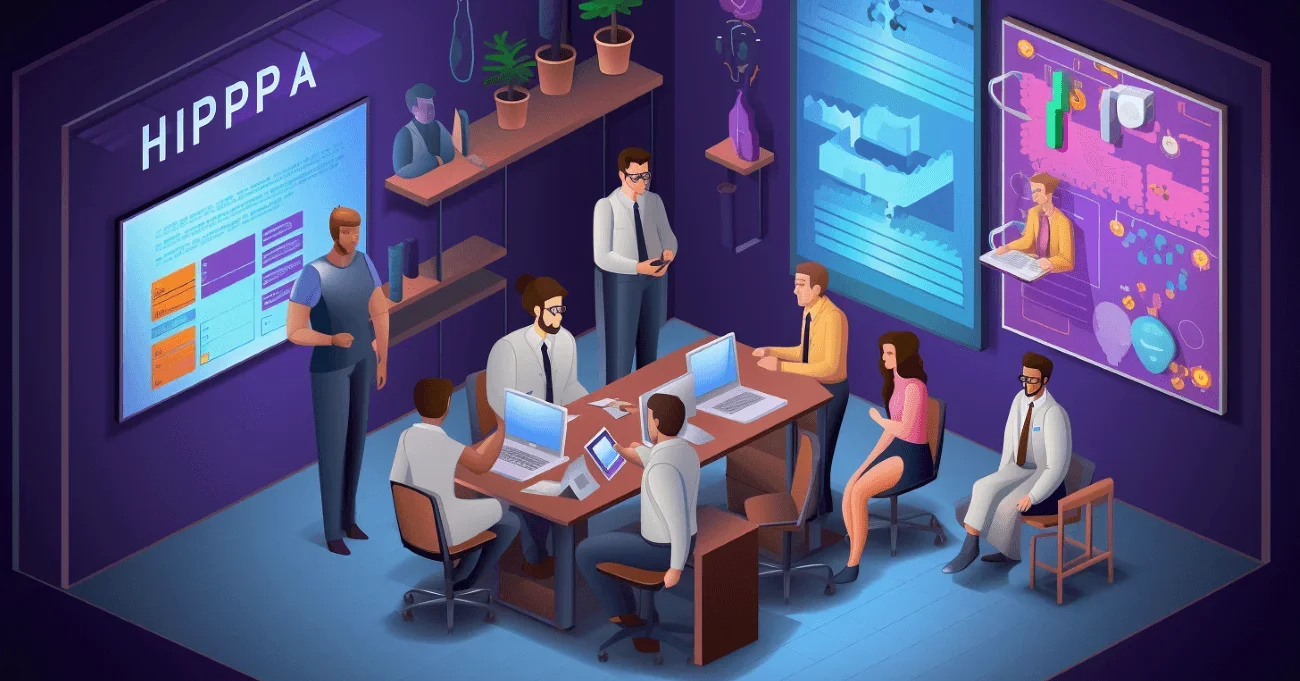HIPAA compliant software development experts are crucial for healthcare businesses, ensuring regulatory adherence, data security controls, and trust maintenance. This compliance fosters data security, credibility, and smooth operations within healthcare regulations. It cultivates trust, encouraging more patients to engage with the business or startup's services, ultimately boosting their clientele and reputation within the healthcare industry.
Aloa, a software outsourcing expert, helps businesses and startups tackle these challenges by offering guidance on effectively hiring software experts who comply with HIPAA regulations. Our team provides valuable advice on the steps and factors to consider throughout this recruitment process. Our expertise enables us to link you with outstanding HIPAA compliant software development experts, steering your software project toward success.
In this blog post, you'll get a considerable edge in recruiting top-tier developers. We're set to take you through an extensive guide that includes reasons for hiring software experts compliant with HIPAA, essential stages in the hiring journey, example ad formats to enhance your search, and crucial aspects to consider when bringing them onboard.
Afterwards, you'll have a clearer grasp on identifying the necessary skills, navigating the hiring process smoothly, and creating engaging job postings specifically designed for HIPAA compliant software development experts. Keep an eye out for practical advice that empowers you to make informed decisions when recruiting top-notch talent for your projects.
Let’s get started!
Why Should You Hire HIPAA Compliant Software Development Experts?
Hiring HIPAA compliant software development experts is a smart move. They specialize in crafting secure systems that prioritize privacy and meet the strict regulations set by HIPAA. Let's explore why their specialized knowledge and experience are crucial in safeguarding sensitive healthcare information and ensuring legal compliance.
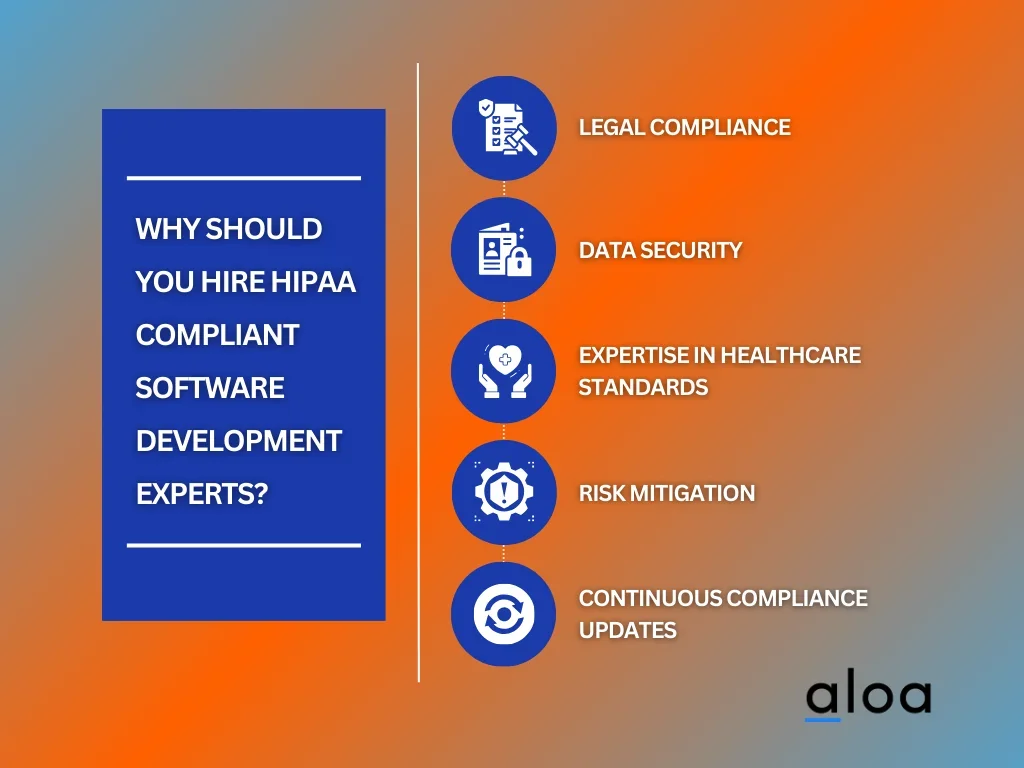
Legal Compliance
HIPAA compliance is mandatory for entities handling protected health information (PHI). Violations can lead to severe penalties, ranging from fines to legal action. Hiring experts versed in HIPAA ensures your software development process aligns with these regulations, protecting your organization from legal repercussions.
Data Security
Healthcare data is a prime target for cyberattacks due to its sensitivity. HIPAA compliant software development experts employ robust encryption, multi-factor authentication, regular security audits, and secure coding practices to protect data from unauthorized access, ensuring patient confidentiality and privacy.
Expertise in Healthcare Standards
These experts understand the complex landscape of healthcare operations and compliance requirements. They integrate essential features like secure data transfer protocols, audit trails for tracking data access, and consent management tools to ensure compliance while maintaining the software's usability and efficiency.
Risk Mitigation
Engaging professionals well-versed in HIPAA significantly reduces the risk of data breaches or compliance violations. Their expertise allows for identifying and mitigating vulnerabilities, safeguarding against potential threats, and mitigating risks associated with non-compliance.
Continuous Compliance Updates
HIPAA regulations undergo periodic updates and modifications. HIPAA compliant software developers stay informed about these changes and implement necessary updates to align their software with the latest compliance standards, ensuring ongoing adherence and reducing the risk of lapses in compliance.
7 Steps in Hiring HIPAA Compliant Software Development Experts
Hiring top-notch HIPAA compliant software development experts demands a meticulous approach and a keen understanding of the unique requirements within the healthcare industry. Take a closer look at our comprehensive hiring guide, designed to help you navigate the complexities of assessing expertise and finding the ideal fit for your needs.
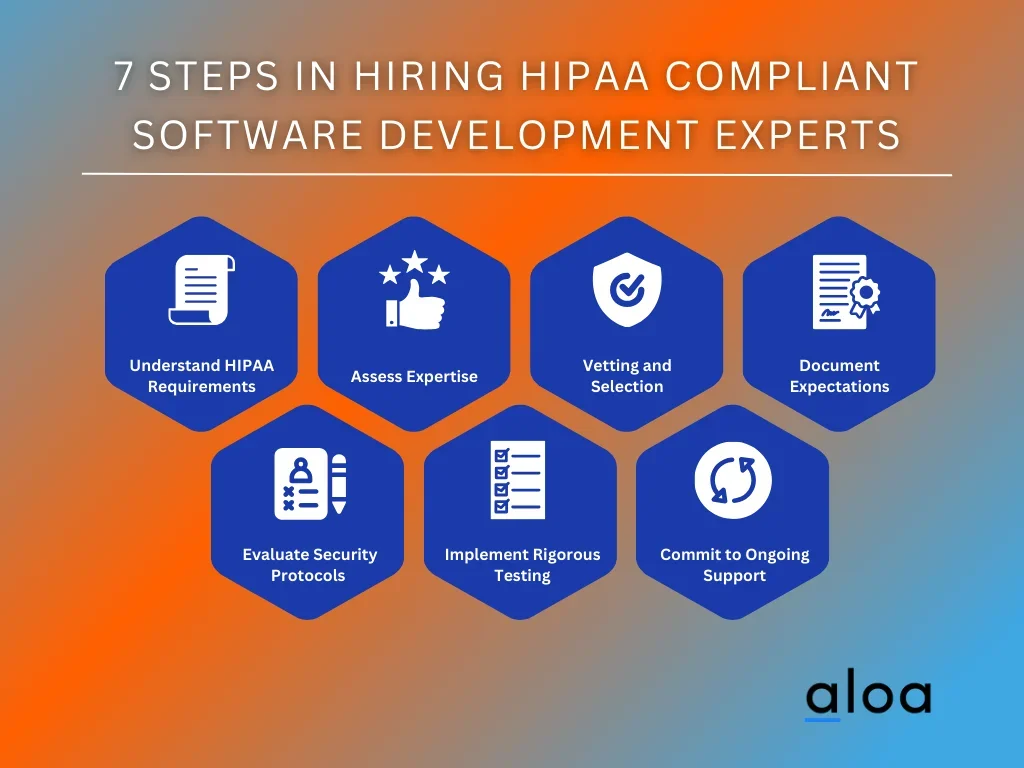
Step 1: Understand HIPAA Requirements
Begin by familiarizing yourself thoroughly with the Health Insurance Portability and Accountability Act (HIPAA) regulations to assess the necessary criteria for compliant software development. HIPAA aims to safeguard patients' health information while allowing appropriate access for healthcare purposes.
Furthermore, it applies to healthcare providers, health plans, clearinghouses, and business associates handling protected health information. These are HIPAA rules and requirements you should understand to ensure compliance when hiring HIPAA compliant software development experts:
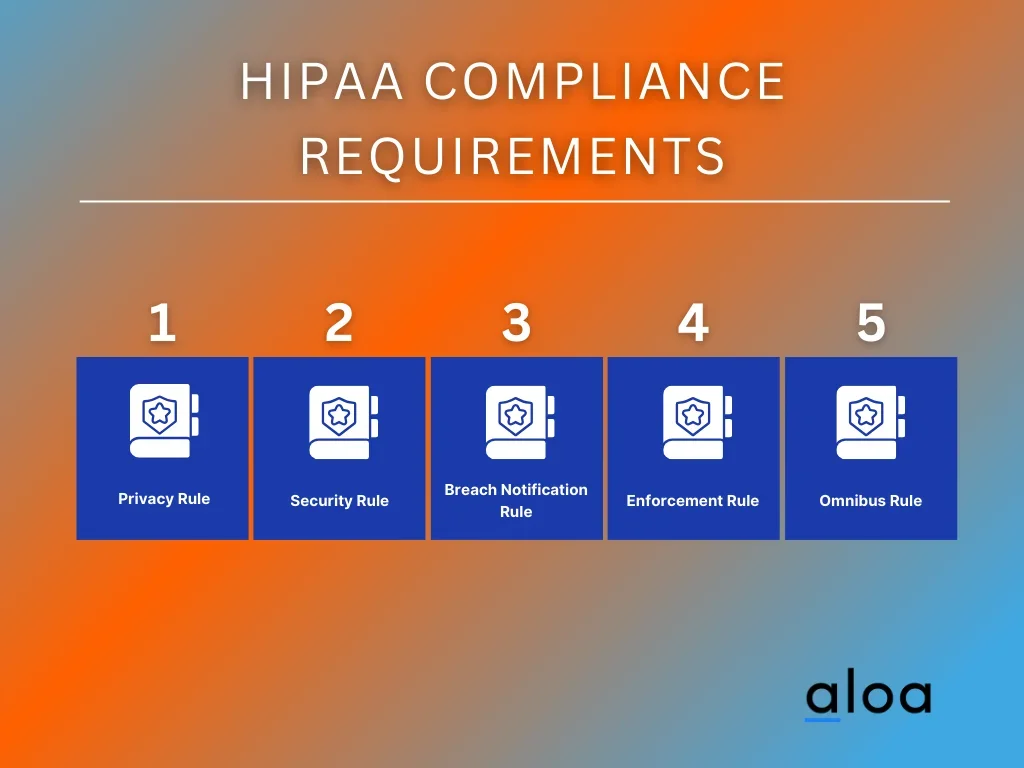
- Privacy Rule: This rule safeguards patients' rights by restricting the use and disclosure of health information, granting them control over their medical records. It also mandates obtaining patient authorization before disclosing sensitive information and necessitates covered entities to provide privacy notices.
- Security Rule: It protects electronic PHI through technical safeguards like data encryption and user authentication. It also establishes access management controls, audit trails to monitor data access, and administrative precautions such as risk assessments and employee training.
- Breach Notification Rule: It mandates prompt notifications of unauthorized data access or unsecured patient health information breaches. Covered entities must inform affected individuals, media, and the Office for Civil Rights (OCR) as part of the transparency emphasis.
- Enforcement Rule: It authorizes the OCR to enforce HIPAA regulations, imposing severe penalties for non-compliance. While it encourages voluntary compliance, it rigorously enforces penalties for violations. The rule investigates complaints and patient data breaches, underscoring the importance of compliance with privacy and security rule requirements.
- Omnibus Rule: It strengthened privacy restrictions and security requirements under HIPAA, extending liability and accountability to business associates and subcontractors. It also enhanced patient rights, clarifying breach notification requirements and imposing new privacy restrictions for healthcare software development.
Step 2: Assess Expertise
Once you’re done familiarizing yourself with HIPAA requirements, evaluate potential software development experts based on their specific experience in building HIPAA compliant solutions. Examine past projects, certifications, and knowledge of HIPAA regulations.
Moreover, this assessment will help hire software developers knowledgeable about the HIPAA compliance checklist, including conducting regular HIPAA compliance assessments and handling notifications of a breach of unsecured PHI. To make it clearer for you, consider these seven key elements:
- Previous Projects in the Healthcare Sector: Review their track record with healthcare-related software projects, focusing on experience in handling PHI and compliance with healthcare regulations.
- Certifications and Training: Assess certifications or specialized training related to HIPAA compliance and healthcare software development to gauge their expertise.
- Understanding of HIPAA Regulations: Evaluate their depth of knowledge regarding the intricacies of HIPAA regulations and their application in software development.
- Security Protocols Implemented: Inquire about specific security measures implemented in previous projects to ensure PHI protection and compliance with HIPAA Security Rules.
- Experience with Compliance Documentation: Determine their proficiency in creating documentation (e.g., risk assessments, compliance reports) required for HIPAA compliance.
- Handling of Data Privacy Challenges: Assess their approach to addressing challenges related to data privacy and how they’ve tackled such issues in past projects.
- Client References and Testimonials: Seek client references or testimonials related to HIPAA compliant software development to validate their expertise.
Step 3: Vetting and Selection
Next, evaluate potential software development vendors or teams meticulously, considering their track record, references, contract details, and alignment with your HIPAA compliance needs. Use this vetting process to make an informed and prudent selection, ensuring the chosen entity can deliver a HIPAA compliant solution effectively.
Aloa's vetting process offers essential resources and assistance in evaluating candidates proficiently. Our expertise aids in recognizing potential issues and confirming that the chosen professionals align well with your project's requirements.
Step 4: Document Expectations
Then, clearly outline expectations, including compliance requirements, in contracts and agreements. Ensure a mutual understanding of maintaining HIPAA compliance throughout the development process and beyond.
Additionally, ensure transparent communication of compliance expectations within contracts and agreements. Properly documenting these expectations establishes a successful and compliant software development process. Here are six elements you should consider when documenting your expectations:
- Clarity: Ensure expectations are clearly stated to avoid misunderstandings or confusion.
- Specificity: Be specific about what is expected, including details on deliverables, timelines, and quality standards.
- Mutual Agreement: Confirm that all parties agree to and understand the documented expectations.
- Compliance Requirements: Clearly outline legal, regulatory, or industry compliance requirements.
- Responsibilities: Define the roles and responsibilities of each party involved in meeting these expectations.
- Updates and Changes: Include a process for managing updates or changes to expectations, ensuring proper communication among stakeholders.
Step 5: Evaluate Security Protocols
After documenting your expectations, it’s time to assess their expertise in HIPAA compliance and verify their prior experience in this area. Review their security protocols, including data encryption, access controls, and audit trails.
Furthermore, ensure they conduct regular security audits and vulnerability testing, follow industry regulations, and stay current with the latest HIPAA policies. Additionally, ask for references from previous clients to gauge their expertise and customer satisfaction. These are some of the general questions you should ask in the hiring process:
- Encryption Standards: Could you detail the encryption methods utilized in protecting sensitive health information within your software? How do you ensure the encryption standards align with industry best practices?
- Access Control Measures: Can you explain how your system controls access to protected health information? What authentication measures are in place to ensure only authorized personnel can access PHI?
- Data Backup and Recovery: What procedures do you have in place for regular data backups and secure recovery of PHI in case of system failures or data loss? How frequently are these backups performed?
- Vulnerability Assessments: How often do you conduct vulnerability assessments on your software? Could you elaborate on the process used to identify and address potential security weaknesses related to PHI?
- Incident Response Plans: In the event of a security incident involving PHI, what steps does your team take to respond? How do you mitigate risks and ensure prompt notification to affected parties as per HIPAA guidelines?
Step 6: Implement Rigorous Testing
Following the evaluation of security protocols, emphasize the importance of rigorous testing and validation of the software to ensure it meets HIPAA standards. This includes simulated testing of security measures and thorough validation of data handling processes.
Moreover, experts conduct various testing methods like penetration testing and code review to identify vulnerabilities. Testing is conducted at all stages of the development process, from design to deployment. Regular testing and updates are necessary to maintain HIPAA compliance as technology evolves.
Step 7: Commit to Ongoing Support
Finally, discuss ongoing support and maintenance post-development. Ensure that the experts are committed to providing continuous support, updates, and necessary adjustments to maintain compliance as regulations evolve.
Furthermore, choosing a team that is committed to the long-term success of your project is crucial. Their familiarity with HIPAA compliance regulations and dedication to ongoing support will ensure the seamless functioning of your software. Make sure to ask about their approach to ongoing support and their experience in this area.
Ad Template When Hiring HIPAA Compliant Software Development Experts
A vital ad template for hiring HIPAA compliant software development experts ensures a thorough understanding of regulatory requirements and expertise in secure data handling. Highlighting key elements guarantees a team focused on patient privacy. Explore this guide outlining key components to incorporate into your ad template.
Job Description
Outline the responsibilities of the role. Include tasks related to developing, implementing, and maintaining software solutions that adhere to HIPAA regulations. Highlight the collaborative nature of the role and any specific compliance-related tasks.
Responsibilities
Detail the expected tasks and duties, such as overseeing HIPAA-aligned software development, conducting compliance assessments, collaborating across teams for integrated compliance, etc.
Qualifications & Requirements
List the qualifications and skills needed. Mention the required years of experience in software development with a focus on HIPAA compliance, knowledge of specific programming languages or tools, familiarity with HIPAA regulations, and any other relevant qualifications.
How to Apply
Provide clear instructions on how interested candidates can apply for the position. Include an email address or a link to your application portal, and encourage applicants to submit their resume and a cover letter outlining their experience in HIPAA compliant software development.
Sample Ad Template for Hiring HIPAA Compliant Software Development Experts
Creating an attractive ad template is crucial for drawing in proficient software development experts who adhere to HIPAA standards. Below is a sample ad template and guidelines to help you craft a practical and compelling job posting.
Job Description
Are you a skilled software developer passionate about healthcare technology? We're seeking talented individuals to join our team in creating cutting-edge, HIPAA compliant solutions that revolutionize patient care.
Responsibilities
- Design and develop software applications adhering to HIPAA regulations
- Collaborate with cross-functional teams to ensure compliance and security standards
- Implement best practices for data protection and privacy in healthcare software
Qualifications & Requirements
- Proficiency in [Programming Languages/Technologies relevant to healthcare software]
- Strong understanding of HIPAA regulations and their application in software development
- Experience in developing secure and compliant software for the healthcare industry
How to Apply
To apply, please send your resume and a portfolio demonstrating your HIPAA compliant software development expertise to [email address] by [application deadline].
Key Factors to Consider When Hiring HIPAA Compliant Software Development Experts
When hiring HIPAA compliant software development experts, weigh various vital factors to ensure the selection of the right professionals for your project. Take a comprehensive view of these factors to make informed decisions throughout the hiring process.
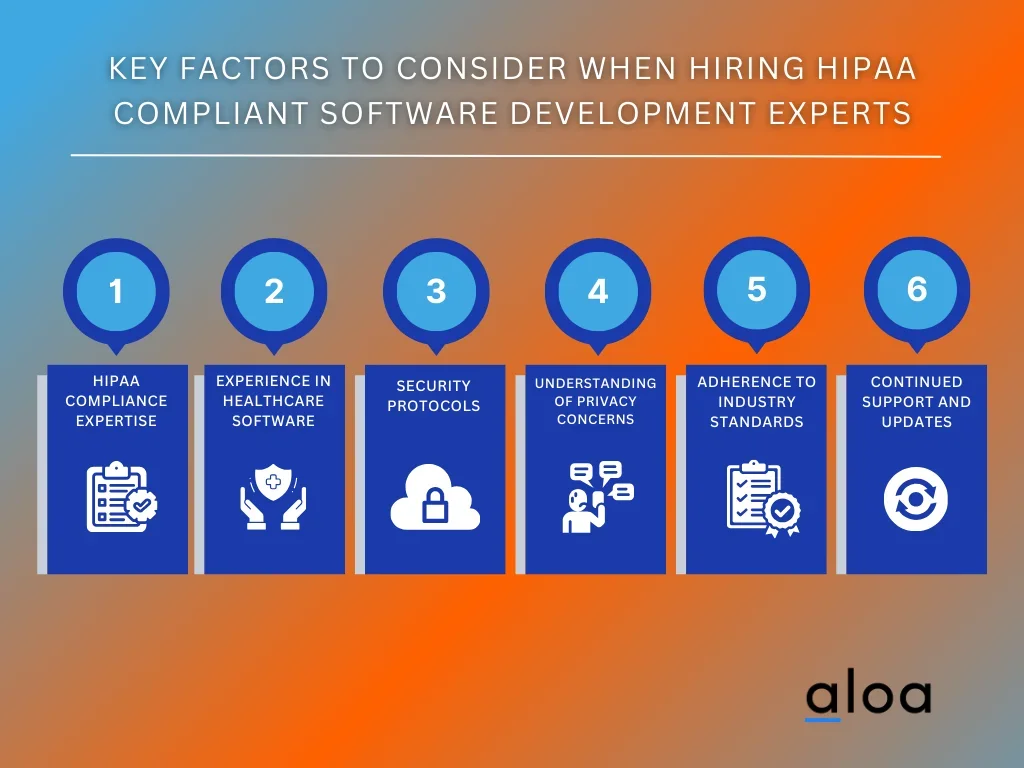
HIPAA Compliance Expertise
Developers proficient in healthcare software development understand the importance of HIPAA compliance. You can verify their expertise in ensuring compliance by assessing their previous projects. It's crucial to confirm their knowledge of the HIPAA security rules and privacy rules to guarantee the development of secure and privacy-centric software.
Experience in Healthcare Software
Look for developers with a proven track record in similar projects, as they can identify potential risks and vulnerabilities in your software. Partnering with a skilled healthcare software developer grants access to broad expertise and resources, especially in navigating HIPAA compliance complexities.
Security Protocols
Check if developers have expertise in implementing robust security measures like encryption algorithms, secure user authentication, data masking, and regular security audits. They should also understand the importance of the software's data segregation and access controls.
Understanding of Privacy Concerns
Look for a team that emphasizes privacy by design. They should demonstrate an understanding of the sensitivity of patient data and showcase strategies to ensure its confidentiality throughout the software lifecycle.
Adherence to Industry Standards
Assess if the team follows HIPAA and broader industry standards such as ISO 27001 for information security management. This ensures a more comprehensive approach to security beyond minimum compliance requirements.
Continued Support and Updates
Inquire about their post-launch support services and commitment to staying updated with evolving HIPAA regulations. An effective team will offer ongoing maintenance, updates, and compliance checks to ensure the software meets changing standards.
Key Takeaway
Choosing the right HIPAA compliant software development experts is crucial for healthcare startups. They navigate complex regulations, ensuring data security and compliance. These experts provide tailored solutions with user-friendly interfaces, building patient trust. They encompass streamlined operations, enhanced security measures, regulatory compliance, and the capability to innovate for growth while safeguarding patient information.
Harnessing the expertise of HIPAA compliant software development experts empowers healthcare startups to adapt swiftly to evolving regulatory landscapes. Their expertise ensures data security, integrating evolving standards seamlessly. This fosters continuous compliance and innovation, enabling startups to prioritize quality care amidst a changing healthcare landscape.
Don’t miss the opportunity to contact us at [email protected] for further insights on enhancing your business strategies through partnering with the best HIPAA compliant software development experts. Prepare to utilize our expertise to steer your startup's technological advancements in the healthcare industry today.

